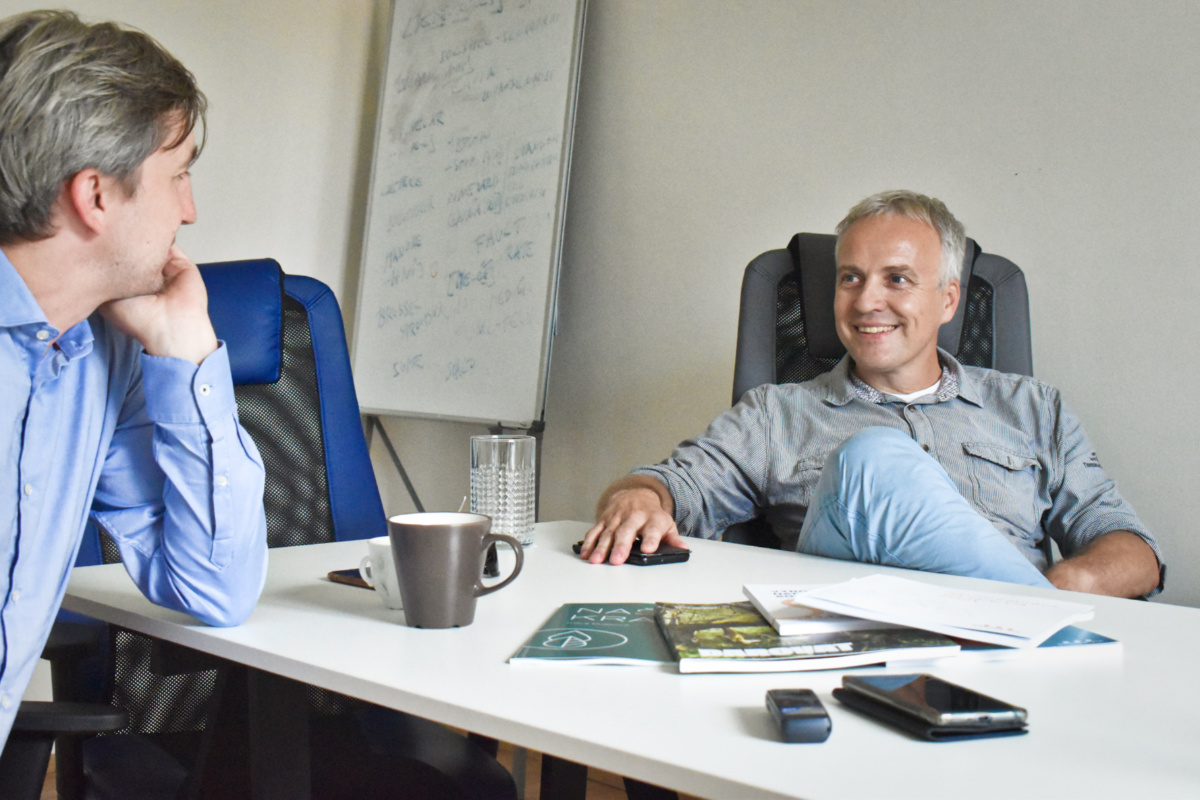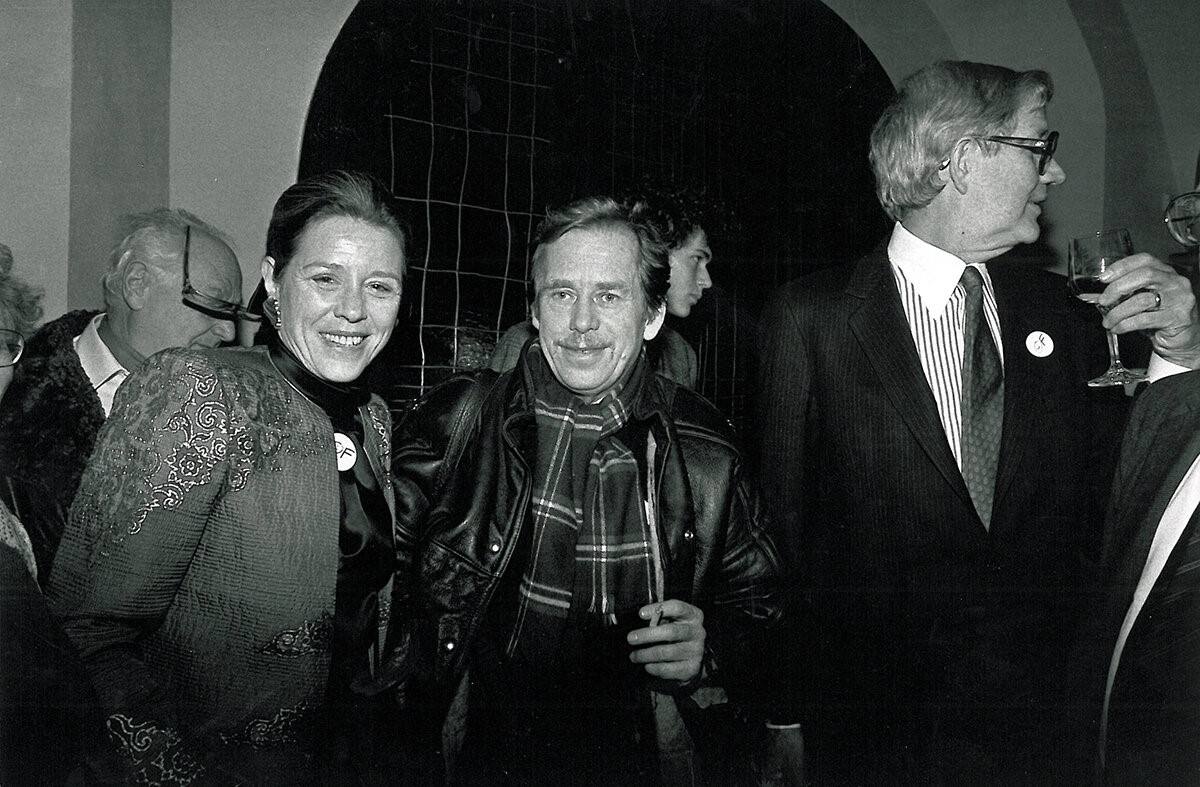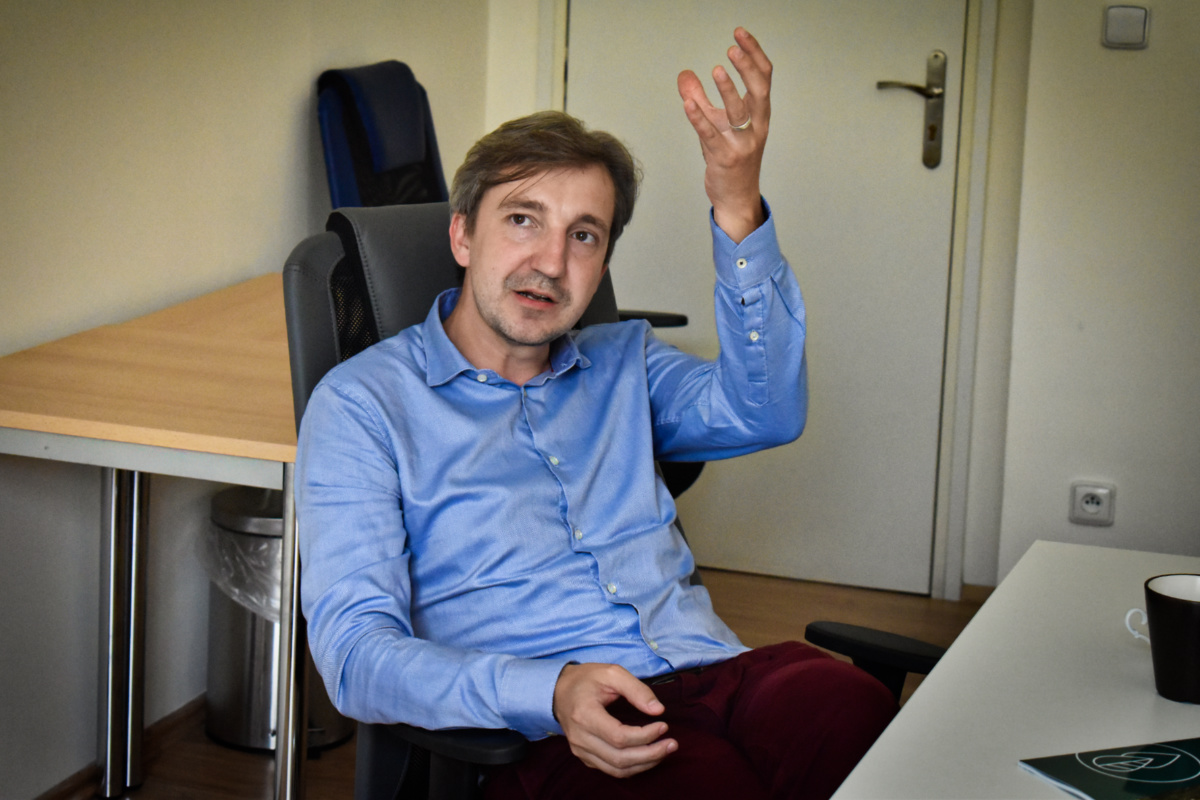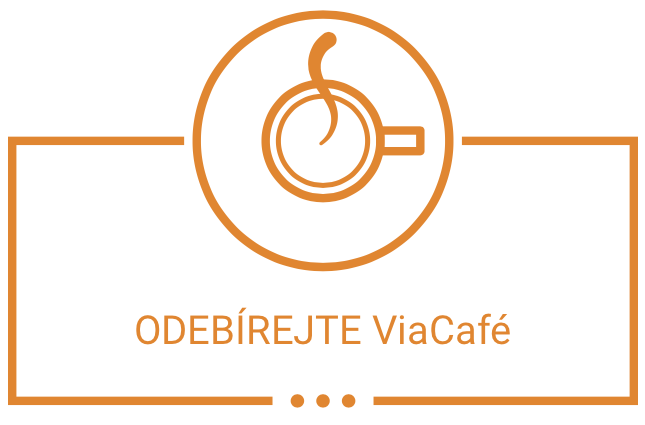On September 4th, 2022, Via Foundation celebrated its 25th anniversary. In honor of this milestone, director Zdeněk Mihalco got together with former director Jiri Barta to share a look back at the foundation’s history and visions for Via’s future.
Zdeněk, Jirka, in what ways do you think Via Foundation has progressed the most over the years?
Zdeněk: Definitely in the way that it manages its assets. And also that it now has twenty-five years of experience.
Jiri: First of all, the context in which it operates has changed a lot, and Via grows as things change in society. I would even dare to say that we helped change that context a little bit, too.
Zdeněk: The prestige of what it means to work in a foundation is also different – when I left the media world to work at Via eight years ago, people were astonished, some even felt sorry for me. It’s a completely different story today.
And what about 25 years ago! Jiri, you threw yourself into running a foundation in the wild 1990s – a time when many people seized the opportunity to go into business. How did people respond to your decision then?
Jiri: They didn’t really understand. Most people probably thought something like “he looks healthy, he has two arms, two legs, he’s not a complete idiot, he could easily work in a bank…”(laughs). They were almost looking to see if I had some disability. Back in 1997 when a person chose to tie his life to building a foundation, people around him didn’t really applaud the move.
Zdeněk: But even though the general perception of non-profit organizations has probably still not improved much in society, when we deal with people in business, we feel that we are viewed differently than before, we are partners.
Jiri: Yes. The fact that nonprofits and businesses join forces after a disaster and are ready to help, together, is a relatively new thing.
You came here straight from a visit to northern Bohemia. Can you tell us what that trip was about?
Zdenek: It was related to one of the things that has and probably will help the foundation move forward in the next twenty-five years – we have a generous donor who has chosen to be a supporter of the foundation even after he’s gone. It’s no secret that Martin Hausenblas has decided to give a portion of his estate to Via Foundation through a charitable bequest.
Jiri: In addition, Martin is currently considering setting up a trust fund and it is possible that we will help him administer it.
Zdeněk: As Jiri will probably confirm, these were not things that would have been on anyone’s mind twenty-five years ago…
Jiri: Definitely not. But our donors from California told us even then that we would have similar trusts here one day. Of course we had no idea what they were talking about.
Let’s stick with history for a moment. The establishment of Via Foundation is linked to many prominent Czech and foreign figures. Jiri, can you tell us the story of Wendy and Bill Luers? And what about attire for Václav Havel? 🙂
Jiri: Wendy and Bill Luers served as the ambassadorial couple at the US Embassy in Prague from 1984 to 1986. Wendy is a vivid person with a huge interest in the world, people and culture. Within a few months here she knew all the dissidents, including Václav Havel. The story goes that Bill brought a tie for Václav to his inauguration, and Wendy brought a blouse for Olga. And when Wendy asked Václav Havel what they could do to help the fledgling democracy in Czechoslovakia, he told her to start a foundation and start helping. Thus The Foundation for Civil Society was established, and later Via Foundation was created as its direct successor.
It is also worth mentioning we have historically had people like sociologist Jiřina Šiklova or writer Pavel Tigrid on the board. And Pavel Tigrid has one great point to his credit – at that time, the question of whether board members should receive a honorary fee was raised. He uncompromisingly told everyone that if it came to the point where this philanthropic and virtuous role was paid, he would quit the board. And that was the end of the discussion.
Zdeněk: Talking about the board sounds a bit bureaucratic, but it plays an extremely important role when it works well. It directs the Foundation’s activities and we are lucky that it has always been a great support to us.
Jiri: That’s right. The Board of Directors has gotten us out of trouble more than once. And we are one of the few foundations that believe in member turnover. It’s natural that a person can devote energy to one project for a limited period of time, let’s say three to six years. And then it’s best to pass the baton on to a new board member.
Jiri, your energy as director lasted for twenty years…Did you ever feel like packing it in?
Jiri: Many times. But no, seriously, it wasn’t the same organization for twenty years.
Zdeněk: I think it’s beautiful to see that in the short time I’ve been running the foundation – it’s never ordinary. Even in those years when it seems like nothing unusual has happened, when I read the annual report I realize that something new was created, something has changed. Society is a living organism – 25 years ago, almost no one in our country knew what the internet was and Facebook didn’t exist. It’s a bit of a paradox when an organization tries to be conservative to weather everything, but at the same time it has to constantly react to things in society, whether it’s a natural disaster, socio-political changes or new technology.
Zdenek, you took over the leadership of the foundation in the fall of 2019, not long before the pandemic and a series of other turbulent events. You probably didn’t expect such a rough test right from the start, did you?
Zdeněk: I don’t know if I had any expectations. It’s a non-transferable experience. As the saying goes, it’s one thing to read about a cesspool, and another to fall into one. There are a lot of uncommon aspects to running an organization, one of them is that you are more or less on your own for some things. And during the pandemic, then the tornado, then the war in Ukraine, everything just accelerated, intensified. On the other hand, I had some energy, and I could take advantage of the fact that I was bringing, perhaps, a slightly different perspective on how we might address problems.
Has your experience as a journalist helped you?
Zdeněk: I think it was more my personality. I tend to look at some things with a bit more distance, to step out of the stream of emotions. And it should also be said that there have always been unexpected events taking place in society.
Jiri: I have to add, now as an observer, that I have a deep admiration for how Zdeněk and the whole foundation handled it. Even those people who until then might have said that Via Foundation was doing nice, but non-essential things, could see, after the tornado in South Moravia, that Via was stepping in even in crises.
Zdeněk: Covid was the key. That was when I formed the view that the foundation as an institution should be stable and self-assured enough to take on a proactive role when such crises arise.
Jiri: And it should be said that these are not the first disasters in which Via has been actively involved. For example, we already had a fairly successful fundraising campaign during the 2002 floods. That doesn’t necessarily mean that we want to replace the role of humanitarian organizations – we simply have the expertise and tools to make it easier for people to donate. So why not take advantage of that.
Why did Via get involved in helping people fleeing the war in Ukraine?
Zdeněk: It’s similar to the other events we mentioned. It was such a huge cause that I can’t imagine not doing anything. It’s just a matter of finding our role in it. We already knew in advance that our two main roles would be to support organizations launching fundraising drives on Darujme.cz, our online giving tool, (there ended up being about 80 of them) and to help people from the bottom up, which is our traditional role. Part of Via’s DNA has always been the belief that a person or an association of people can do something specific and good for the neighborhood they live in – currently for people coming to live here from Ukraine. And when you have 300 of these small local actions, the change becomes visible.
You come from Bruntál, a region with a peculiar reputation. How do you explain your job to the locals?
Zdeněk: The locals are surprised that there is even an organisation that can serve them. Misunderstandings often arise because people feel that NGOs are for people in serious trouble. I try to explain it by saying that we are there for them, that we can help make their lives a little better.
Which project was closest to your heart?
Zdeněk: My favourite thing about the foundation is its ordinariness. The very small projects that people do in their everyday lives. We work with contrasts, where on the one hand we have, for example, the restoration of a cemetery in a small border village and on the other hand people who have created and built up a company. These two groups have something in common – they are successful people, they have a fulfilling life, they become an inspiration for others. And we have the good fortune of meeting them and connecting them with one another.
Jiri: A place that I have a lot of memories from, and which makes me think of Via’s usefulness, is Velvary. We entered the community a few years ago with a big community grant in the “The Community in Which We Live” program, where the goal was to give local people the opportunity to dream up a new function for a public space. That’s how Malvaňák was created (restoration of a former outdoor swimming pool at Malovarský Pond dating from the First Republic – ed.) and then other things started to happen – Radim Wolák, the volunteer who organized the project, was asked by the then-mayor if he would like to take over the management of the village. Radim became mayor and started to influence the town from his new position, while still maintaining his community approach. There’s clearly a long-term impact on residents’ lives there. So even relatively small things can translate into bigger change over a number of years.
Zdeněk: Changes in society are apparent there, too. One of Radim’s current interests is landscape stewardship, which has become a phenomenon in recent years. And with local elections coming up, we know that there are dozens of such “Radims” all around the Czech Republic.
What do you think Via Foundation could look like in another 25 years, i.e. in 2047? Will it still exist?
Zdeněk: Of course! Via Foundation has to exist for at least 50 years, otherwise there is no point. Personally, I believe it will have more resources, it will manage more assets, and therefore it will have more impact. I would really like it to be even more open towards Europe and also to keep that ordinary human dimension based on relationships.
Jiri: Via Foundation in 2047 will be exactly as it should be. In principle, it will stick to its DNA, but it will look for “its own thing”. I would like it to be able to change in accordance with the way people live.
Zdeněk: And we can assume that what we can’t see at the moment will somehow be connected to the development of technology.
Jir: I don’t usually have dark visions, but it’s possible that the world and the people in it will be so dominated by various applications by that time that we will strive for the simple preservation of humanity.
Zdeněk: I agree that the search for harmony between humanity and technology will probably be a big topic. We’ll see what our colleagues will say in 25 years…
Do you think you’ll be part of it then?
Zdeněk: I think that by then I will be content to watch my successors, just as Jiri is now.
Now you have the space to ask each other anything you like.
Jiri: When was the last time you wanted to pack it in?
Zdenek: The hardest for me was the pandemic period, when we couldn’t meet as a team in person. I wouldn’t want to work in an organization that only works online. With young children and my own illness that I was going through at the time, I was seriously reassessing the situation. But lately, I feel good about how everything has been able to come into balance. And I’m happy about how great our team is. And you, Jiri, have you ever had the urge to come back?
Jiri: I haven’t. And I don’t even think I have the slightest reason to, the foundation is obviously thriving. Maybe I even went on a bit too long.
Jiri, what would you wish Zdeněk and the whole foundation?
Jiri: That Via Foundation will always be a place for them where they still find meaning in life, where joys outweigh worries, where they will meet people who are doing beautiful things. And also generous donors and great board members and chairs, because without them, we can’t do it.
Zdenek, you have the last word.
Zdenek: I would like to thank not only Jiri, but all the founders for allowing me to do this work, because without it my life would be emptier. My principles and personal values are 100% in line with what I do.
Zdeněk Mihalco
He worked in the media for 10 years, as editor and editor of Aktuálně.cz, Hospodářské noviny and Forbes magazine. He has worked at Via Foundation since 2015 and has been its director since autumn 2019.
Jiri Bárta
He was the head of Via foundation until September 2019. He now works as an independent fundraising consultant and focuses on working with large donors. He is the chairman of the board of Via Clarita Foundation, a sister organization of Via Foundation.
Interview conducted and photographed by: Monika Skopalová, Via Foundation







